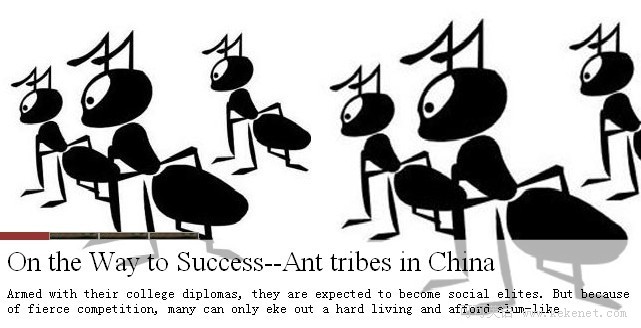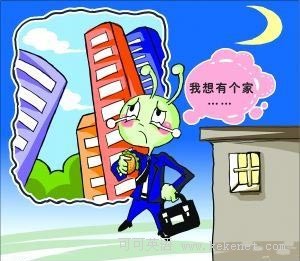(单词翻译:单击)
毕业之后,生活扑面而来,梦想流离失所。
繁华都市,我们就是在生活下面早出晚归、渺茫无措的蚂蚁...
比“蜗居”更苍茫,更找不到出路...
Armed with their college diplomas, they are expected to become social elites. But because of fierce competition, many can only eke out a hard living and afford slum-like accommodation.
What does the future hold for members of the ant tribes, groups of 20-something college graduates, existing on low incomes in big cities throughout China?
In today's program, He Fei takes a closer look at the ant tribe lifestyle to bring us more.
"Where is our hope?
Where is our dream?"

Singing out their questions in the song, Li Liguo and Bai Wanlong also raise the questions for many other members of ant tribes living in the famous suburban slum-like village called Tangjialing on the outskirts of Beijing.
With the dream of pursuing their music dreams, the two sing in underground passages during the day and return to their boxy room each evening. The room costs each of them 200 yuan, or about 30 U.S. dollars, per month.
Li Liguo came to Beijing after he graduated from a university in northeastern Liaoning Province. He has been struggling in the nation's capital for four years. He says the phrase "ant tribe" is a proper description of his life.
"Just like the ants, we can hide nowhere in this big city. We cannot afford to rent a stable home, not one like this. We have to always move like ants do."
The low rent in Tangjialing village is the reason why Li Liguo has decided to stay here.
Located in the northern part of the city, the village is laced with dusty roads and crowded with cheap markets and shabby accommodations. It provides a warm home for 50 thousand young college graduates.
Twenty-seven-year-old Wang Haitao, another member of the Tangjialing village ant tribe, shows us his room.
"The room I rent is similar to the dormitory at my college. I only need to pay 450 yuan each month. Although it is without an indoor toilet, I am satisfied to have it for such low rent."
Young people can rent a bed in a dorm-like room less than 10 square meters but crammed with eight beds for less than 500 yuan, or about 70 dollars, a month. But even the low rent accounts for a major part of their salaries.
"According to our survey, the average wage for the ant tribe in Beijing is no more than 2,000 yuan, which is lower than the average income of overall Beijing residents."
Giving out the data is Lian Si, a sociologist at the Beijing-based University of International Business and Economics.
The phrase "ant tribe" came about from a two-year survey and an anthropological study he published in late 2009.
"In fact, the ant tribe is just a nickname for what we call the group of low income college graduates. They are characterized by high academic qualifications, low salaries, are mostly in their 20s and live in compact communities."

Lian Si says there are about 10 such compact communities in Beijing such as Tangjialing and Xiaoyuehe, which has attracted about 100 thousand ant tribe members. Altogether there are about 1 million ant tribe members nationwide.
The results of Lian's survey indicate that the majority of these young graduates come from rural areas or small cities across China.
They choose to stay on the fringes of big cities like Beijing and Shanghai after graduation, rather than go back to their hometowns.
Zhang, a college graduate from Shandong Province in eastern China, tells us why he has decided to stay in an ant tribe.
"According to the average living standards in Beijing, my current salary is pretty low. However, staying in a big city means I can still have a vast number of opportunities."
More work opportunities is the main reason that members of the ant tribe stay in quickly developing cities. But they are forced to live in lower cost suburban areas.
Lian Si says most members of the ant tribe are from poor rural families and take temporary, low-paid jobs such as insurance agents, electronic products sales representatives and waiters. Some are unemployed or underemployed.
But it maybe even harder for them to find a job back home.
"One of the examples in my book is a young man named Deng Kun. He is a college graduate who majored in biological engineering. He told me that he could not go back to his hometown where people don't even understand what his major is. They thought he learned about how to raise cattle."
Lian's opinion is echoed by other experts.
Wen Tiejun, a researcher at the Beijing-based Renmin University, says the ant tribe phenomenon is caused by the imbalanced development between large and small cities.
"Over the past several decades of development, we have seen little investment flow into medium-sized and small cities. With insufficient investment, few job opportunities suitable for graduates are available in small cities. So college graduates tend to flock to big cities to try their luck."
The glut of college graduates is another reason why ant tribes have formed.
China began expanding university enrollment in the late 1990s to meet growing personnel demands, leading to a surge of graduates over the past decade. More than 6 million students graduated last year, about half a million more than in 2008.
Li Chunling, a socialist from the Chinese Academy of Social Sciences, says when most university administrators decided to expand enrollment, they failed to consider market demand while setting up different majors.
"We are certainly seeing a surging number of college graduates suddenly appearing in the job market, because Chinese universities expanded enrollment in just a short period of time. However after enrollment, there was a lack of instruction on the campus to teach new graduates how to correctly adapt to the job market and how to properly choose and apply for a job."
Besides a shortage of job opportunities, Li Chunling says that he believes high social expectations for college graduates are another reason behind the proliferation of ant tribes.
Three decades ago, when many Chinese cities embarked on their development booms, the workforce favored university degree-holders over traditional state-run factory workers.
But with the generalization of higher education, Li Chunling says the value of a college diploma is dropping, while most people are still reluctant to accept the fact.
" It's not a unique thing in China, as it happens in other countries too. However, what makes it seemingly prominent in China is that college graduates used to be favored by workforces decades ago. So these young people entered college with the expectation of finding a decent job easily after graduation. However, they are disappointed by the harsh reality."
The Ministry of Education says about 6.3 million graduates will compete for jobs across the country this year, which could intensify the competition.
To deal with the problem, the state government has issued policies to encourage employment.
Yin Weimin, head of the Ministry of Human Resources and Social Securities, says employment has always remained high on the government agenda.
"First of all, we will strive to expand the employment channels for college graduates; and second, encourage them to work in grassroots units, large or medium-sized enterprises. Meanwhile, we also encourage them to start up their own businesses."
Besides creating more job opportunities and narrowing the gap between developed and underdeveloped areas, sociologist Li Chunling also suggests that the government provide more social welfare policies to help those low income graduates cope with soaring prices.
"The difficulties from the campus to the job market are common worldwide. What we should learn is to establish a comprehensive welfare system to support them, as these graduates and even their families are not well-prepared to face unemployment right after graduation. And even after they get employed, welfare policies like low-rent apartments are necessary to ensure their well-being."
Besides living conditions, Li Chunling says the ant tribe's psychological health is another important factor that cannot be ignored.
Lian Si, the sociologist and author of the book "The Ant Tribe" discusses the results of his two-year survey.
"We can see that they are still holding a positive attitude toward life. Although their dreams are seemingly far away, they believe in waiting and hoping. I'm very impressed with the motto of one member of an ant tribe, which is, 'I am not a looser; I am just on my way to success.'"
Lian Si says it is impossible for the government to create enough job opportunities for each of the ant tribe member, but together with care and love from society, we can give them a warmer and healthier emotional environment.
"We truly hope that the experience of being a member of an ant tribe can be a treasure and not a misery for their lives. With their guts and hard work, who can say that they cannot become the next middle-class generation and realize their dream? Their experience will affect their values in society and life. Given more love and attention, they will provide more rewards for the whole society in the future."


